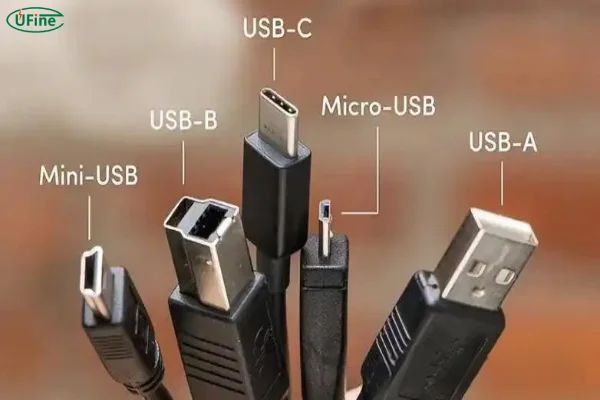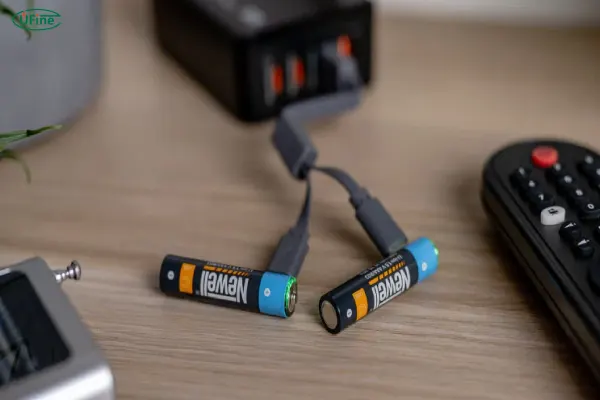Part 1. Understanding USB types
Before we dive into the different types of batteries with USB, it’s essential to understand the various USB types you might encounter. USB (Universal Serial Bus) comes in multiple variations, each designed for different use cases and devices. Here’s a quick rundown of the most common types:
USB-A
This is the standard USB connector you’ve likely seen for years. It’s large, rectangular, and used in many devices like computers, chargers, and some power banks.
USB-B
Typically found in larger devices like printers, USB-B connectors are square-shaped and used less frequently in mobile applications.
USB-C
The newer, more versatile USB-C is gaining popularity. It’s reversible, meaning you can plug it in either way. It supports faster data transfer speeds and higher power delivery, making it the preferred connector for modern smartphones, laptops, and many other devices.
Micro USB
Once the standard for smartphones and many gadgets, micro USB is now being replaced by USB-C in many devices, but it’s still common in older products.
Lightning
This connector is proprietary to Apple devices, including iPhones, iPads, and iPods. It’s a bit different from traditional USB ports and isn’t directly compatible with most USB power banks unless you use an adapter.
Mini USB
Similar to micro USB, the mini USB was once used in digital cameras and other small electronics. It’s a bit larger than micro USB and is now largely outdated.
Part 2. Types of battery with USB
Batteries with USB connectors are widely used because of their ease of use and versatility. There are several types of batteries with USB depending on the application, and each has its unique features:
Power Banks
These are the most common type of battery with USB. A power bank typically features a USB output to charge smartphones, tablets, or any other USB-powered device. Some power banks come with USB-C outputs for faster charging or USB-A ports for more universal compatibility.
Rechargeable Batteries with USB Charging
These batteries are designed to be directly charged via a USB port. Many AA or AAA rechargeable batteries now come with a USB port, eliminating the need for a separate charger.
Battery Packs for Laptops and Electronics
Some laptop batteries and other electronic battery packs come with a USB-C port, allowing users to charge their devices directly via USB, which is a more flexible and universal charging method.
Portable Solar Batteries with USB
These batteries are designed for outdoor enthusiasts. Solar-powered batteries with USB charging capabilities can be charged via sunlight and used to charge smartphones and other devices in remote areas.
USB-Powered Bike Batteries
Used in electric bikes, these battery packs come with USB ports for charging and powering devices like GPS systems, lights, or phones during long rides.
Part 3. Why is a battery with USB better?
The key reason why batteries with USB are so popular is their convenience and versatility. Here are some reasons why they’re better than traditional battery solutions:
1. Universal Compatibility
Most modern devices come with USB charging ports. By using a battery with USB, you eliminate the need for multiple chargers. A single USB cable can charge a variety of devices, making your setup more organized and user-friendly.
2. Portability
Batteries with USB are designed for on-the-go convenience. Whether you’re traveling or working remotely, having a USB battery allows you to power your devices without needing an outlet.
3. Faster Charging
Many USB-C batteries support fast charging, which is a significant upgrade over traditional chargers. This means your device gets juiced up quicker, making life easier when you’re in a rush.
4. Eco-Friendly
Many USB batteries are rechargeable, reducing the waste created by disposable batteries. This makes them a more sustainable choice for environmentally-conscious consumers.
5. Multi-Purpose
USB batteries aren’t just for charging phones. They can also power headphones, tablets, laptops, and other USB-enabled devices, offering exceptional flexibility.
Part 4. Ufine Battery with USB
Ufine Battery offers customizable solutions to meet your specific needs. Whether you’re looking for power banks or rechargeable USB batteries, Ufine allows you to select the USB type (USB-A, USB-C, or even Lightning) and customize your battery based on voltage, size, and charging capacity.
If you have unique requirements, Ufine’s custom solutions can accommodate different interfaces, cables, and additional features. They ensure that your USB battery fits perfectly into your lifestyle or business model.
Feel free to contact us for personalized options that meet your needs!
Part 5. Applications of battery with USB
Batteries with USB are more than just for smartphones. Their applications extend across a wide range of industries and devices:
1. Personal Electronics
Smartphones, tablets, and portable game consoles all benefit from USB-powered batteries, keeping your devices charged while on the move.
2. Electric Vehicles (EVs)
Some EVs come equipped with USB charging ports for powering accessories or gadgets on the go.
3. Outdoor Adventures
Whether you’re camping, hiking, or exploring, solar-powered USB batteries are a must-have for powering flashlights, GPS devices, and portable speakers in remote locations.
4. Powering Small Gadgets
Devices like Bluetooth speakers, fitness trackers, and wearable tech often come with USB-compatible batteries that can be charged easily through a USB port.
Part 6. Buying a battery with USB: Key points
When purchasing a battery with USB, it’s important to consider several factors to make sure you choose the right one for your needs. Here are some tips:
- Check Compatibility: Ensure the battery has the right type of USB port for your device (USB-A, USB-C, etc.).
- Capacity: Look at the battery capacity (measured in mAh) to ensure it’s sufficient for your device’s needs.
- Charging Speed: If you need fast charging, opt for a USB-C battery that supports fast charging standards.
- Portability: Choose a compact and lightweight design for easy carrying.
- Durability: For outdoor use, consider a waterproof or shock-resistant model.
Choosing USB Rechargeable Batteries: Tips and Tricks
Part 7. Is it safe to charge a battery with USB?
Charging a battery with USB is generally safe, but it’s important to follow best practices:
- Use the correct USB cable and avoid using damaged or frayed cables.
- Don’t overcharge or leave your device plugged in for excessive periods.
- Check for overheating: If the battery feels too hot, disconnect it and let it cool down before resuming charging.
- Choose reputable brands to ensure that the battery has proper safety features, such as overcharge protection.
Part 8. What devices are not compatible with a battery with USB?
While USB batteries are versatile, there are some devices that might not work well with them:
- High Power Devices: Some devices, like high-end gaming laptops or power-hungry appliances, may require more power than a USB battery can provide.
- Non-USB Devices: Devices that don’t have a USB input (e.g., older home electronics or certain cameras) may not be compatible unless you use an adapter.
Related Tags:
More Articles

Understanding the 11.1V Lipo Battery: Features, Benefits, and Common Applications
The 11.1V LiPo battery powers RC models, drones, and more. This guide covers its features, benefits, and common applications.
Lithium Ion Jump Starter vs. Lead Acid: What’s the Real Difference?
A lithium-ion jump starter offers a fast, reliable way to start a dead car battery. Here's how it compares to traditional lead-acid models.
How to Safely Clean Leads from a Leaking Battery: Step-by-Step Guide
This step-by-step guide covers risks, safety tips, and proper cleaning methods for safely cleaning leads from a leaking battery.
Portable Battery Charger vs. Power Bank: What’s the Difference?
A portable battery charger includes any portable charging device, while a power bank stores energy in a battery to charge devices without a power source.
The Ultimate Guide to Using a Lithium-Ion Jump Starter
A lithium-ion jump starter is essential for car emergencies. This guide covers its use, safety, maintenance, and why it's a smart investment.






